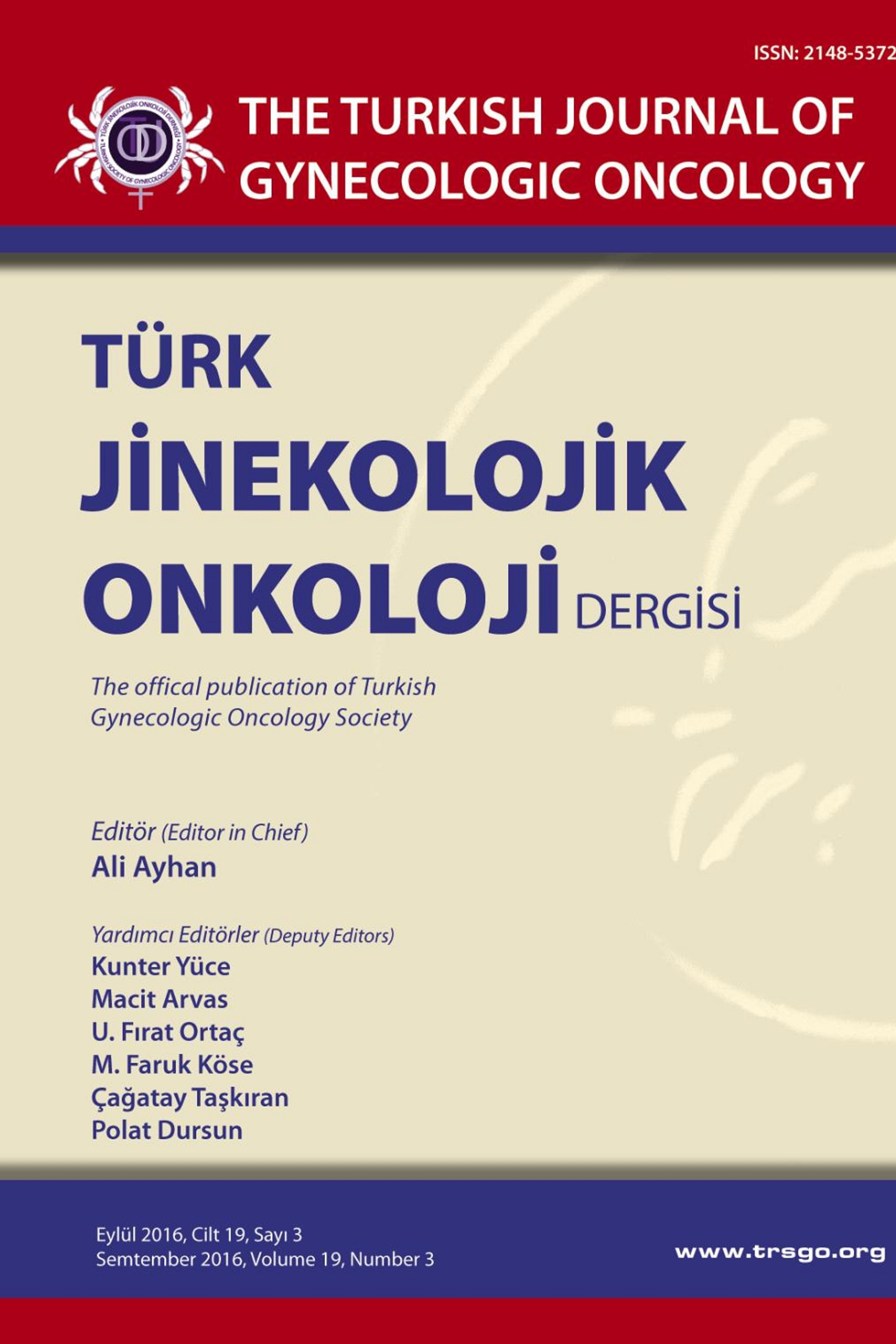SERVİKS KARSİNOMU VE YÜKSEK DERECELİ SKUAMOZİNTRAEPİTELYAL LEZYONLARDA SERUM FOLAT, VİTAMİN B12,HOMOSİSTEİN VE ESER ELEMENT DÜZEYLERİ
Serviks Kanseri, Yüksek Dereceli Skuamoz İntraepitelyal Lezyon, Vitamin B12, Folat, Homosistein, Eser Element
SERVİKS KARSİNOMU VE YÜKSEK DERECELİ SKUAMOZİNTRAEPİTELYAL LEZYONLARDA SERUM FOLAT, VİTAMİN B12,HOMOSİSTEİN VE ESER ELEMENT DÜZEYLERİ
Cervical Cancer, High Grade Squamous Intraepithelial Lesion, Vitamin B12, Folate, Homocystein, Trace Element.,
___
- 1. Jemal A, Bray F, Center MM, Ferlay J, Ward E, Forman D (2011) Global cancer statistics. CA Cancer J Clin 61 (2):69-90. doi:caac.20107 (pii) 10.3322/caac.20107.
- 2. Schiffman MH, Castle P (2003) Epidemiologic studies of a necessary causal risk factor: human papillomavirus infection and cervical neoplasia. J Natl Cancer Inst 95 (6):E2.
- 3. Ostor AG (1993) Natural history of cervical intraepithelial neoplasia: a critical review. Int J Gynecol Pathol 12 (2):186-192.
- 4. Butterworth CE, Jr. (1992) Effect of folate on cervical cancer. Synergism among risk factors. Ann N Y Acad Sci 669:293-299.
- 5. Mason JB, Levesque T (1996) Folate: effects on carcinogenesis and the potential for cancer chemoprevention. Oncology (Williston Park) 10 (11):1727-1736, 1742-1723; discussion 1743-1724.
- 6. Hoffbrand AV, Weir DG (2001) The history of folic acid. Br J Haematol 113 (3):579-589. doi:bjh2822 (pii).
- 7. Alberg AJ, Selhub J, Shah KV, Viscidi RP, Comstock GW, Helzlsouer KJ (2000) The risk of cervical cancer in relation to serum concentrations of folate, vitamin B12, and homocysteine. Cancer Epidemiol Biomarkers Prev 9 (7):761-764.
- 8. Flynn MA, Herbert V, Nolph GB, Krause G (1997) Atherogenesis and the homocysteine-folate-cobalamin triad: do we need standardized analyses? J Am Coll Nutr 16 (3):258-267.
- 9. Weinstein SJ, Ziegler RG, Selhub J, Fears TR, Strickler HD, Brinton LA, Hamman RF, Levine RS, Mallin K, Stolley PD (2001) Elevated serum homocysteine levels and increased risk of invasive cervical cancer in US women. Cancer Causes Control 12 (4):317-324.
- 10. Martin-Lagos F, Navarro-Alarcon M, Terres-Martos C, Lopez GdlSH, Lopez-Martinez MC (1997) Serum copper and zinc concentrations in serum from patients with cancer and cardiovascular disease. Sci Total Environ 204 (1):27-35. doi:S0048969797001630 (pii).
- 11. Lowndes SA, Adams A, Timms A, Fisher N, Smythe J, Watt SM, Joel S, Donate F, Hayward C, Reich S, Middleton M, Mazar A, Harris AL (2008) Phase I study of copper-binding agent ATN-224 in patients with advanced solid tumors. Clin Cancer Res 14 (22):7526-7534.
- doi:14/22/7526 (pii) 10.1158/1078-0432.CCR-08-0315 12. Wu T, Sempos CT, Freudenheim JL, Muti P, Smit E (2004) Serum iron, copper and zinc concentrations and risk of cancer mortality in US adults. Ann Epidemiol 14 (3):195-201. doi:10.1016/S1047-2797(03)00119-4 S1047279703001194 (pii).
- 13. Poljak-Blazi M, Jaganjac M, Sabol I, Mihaljevic B, Matovina M, Grce M (2011) Effect of ferric ions on reactive oxygen species formation, cervical cancer cell lines growth and E6/E7 oncogene expression. Toxicol In Vitro 25 (1):160-166. doi:S0887-2333(10)00271-7 (pii) 10.1016/j.tiv.2010.10.013.
- 14. Lee DH, Zacharski LR, Jacobs DR, Jr. (2006) Comparison of the serum ferritin and percentage of transferrin saturation as exposure markers of iron-driven oxidative stress-related disease outcomes. Am Heart J 151 (6):1247 e1241-1247. doi:S0002-8703(06)00266-3 (pii) 10.1016/j.ahj.2006.03.009.
- 15. Stevens RG, Cologne JB, Nakachi K, Grant EJ, Neriishi K (2011) Body iron stores and breast cancer risk in female atomic bomb survivors. Cancer Sci 102 (12):2236- 2240. doi:10.1111/j.1349-7006.2011.02080.x
- 16. Cross AJ, Sinha R, Wood RJ, Xue X, Huang WY, Yeager M, Hayes RB, Gunter MJ (2011) Iron homeostasis and distal colorectal adenoma risk in the prostate, lung, colorectal, and ovarian cancer screening trial. Cancer Prev Res (Phila) 4 (9):1465-1475. doi:1940-6207.CAPR11-0103 (pii) 10.1158/1940-6207.CAPR-11-0103
- ISSN: 2148-5372
- Başlangıç: 2014
- Yayıncı: Türk Jinekolojik Onkoloji Derneği
JİNEKOLOJİK VE JİNEKO-ONKOLOJİK CERRAHİDE VENÖZ TROMBOEMBOLİZM PROFİLAKSİSİ
Ümran KÜÇÜKGÖZ GÜLEÇ, Ahmet Barış GÜZEL, Süleyman Cansun DEMİR, Mehmet Ali VARDAR, Aytekin ALTINTAŞ
Dimitrov GO, Dimitrov GL, Dzikova E, Panov S, Ceselkovska M, Babusku GJ
Müjdegül ZAYIFOĞLU KARACA, Cihan TOĞRUL, Eralp BAŞER, Bülent ÖZDAL, Tayfun GÜNGÖR
Bülent ÖZDAL, Sevgi AYHAN, Eralp BAŞER, Oğuz Devrim YARDIMCI, Levent ŞİRVAN, Tayfun GÜNGÖR
Mete ÇAĞLAR, Aysel U. DERBENT, Mine KANAT PEKTAŞ, Onur EROL, Mustafa ÖZAT, Selahattin KUMRU
ROBOTİK RADİKAL PARAMETREKTOMİ, PELVİKLENFADENEKTOMİ, VAJEN 1/3 ÜST KISMININ ÇIKARILMASI:OLGU SUNUMU
